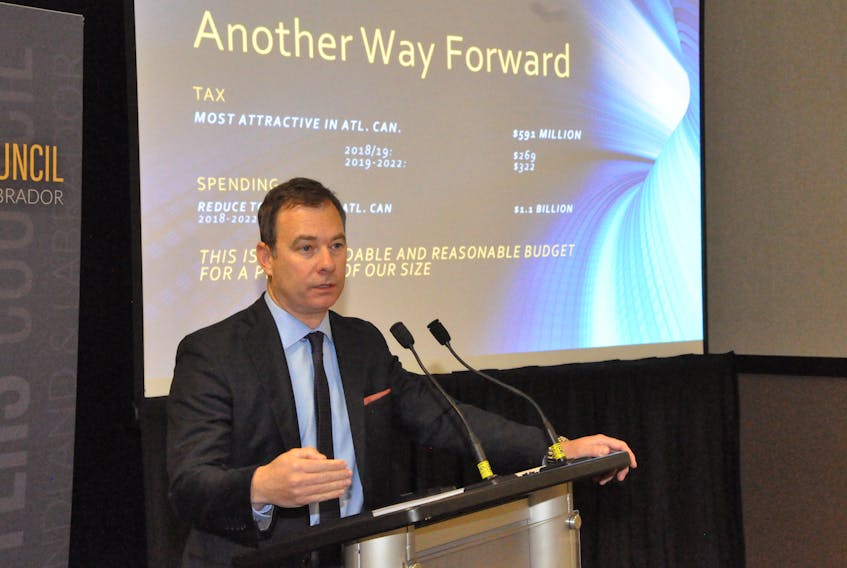Every man, woman and child in Newfoundland and Labrador likely have their own ideas — or have adopted the opinions of pundits — about how to solve the province’s fiscal challenges.
The Newfoundland and Labrador Employers’ Council (NLEC), in response to a survey that indicates more people are at least considering leaving the province and with the aid of research conducted by the Conference Board of Canada, has developed a plan of its own that calls for nearly $600 million in tax cuts and a $1.1-billion reduction in spending over the long term.
“If government’s current plan is such that their taxation levels are so high that taxpayers and businesses are thinking about moving out of the province, what other choice do you have than to address that problem?” asks NLEC executive director Richard Alexander.
“The spending reductions that would have to occur in order for us to be able to afford that and pay for those reductions and keep people here in the province are still well above what other provinces in Canada are paying.”
Another Way Forward, a tongue-in-cheek nod to the Liberal administration’s own vision for the province’s prosperity and growth, calls for the government to eliminate both the deficit reduction levy and the gas tax in the 2018 budget — a revenue reduction of $249 million.
“No matter what you call the tax — personal tax, deficit reduction levy, gas tax, whatever — it all comes from the same wallet. When you add up all these personal taxes, Newfoundland and Labrador has the second-highest personal tax burden of any province in Canada, only behind Quebec.”
It also urges the government to reduce personal income tax, while removing corporate capital tax and payroll tax over a three-year period, resulting in a $322-million revenue cut.
To balance things out and find $1.1 billion in savings, Alexander and NLEC insist the provincial government needs to address its spending problem. Based on the Conference Board of Canada’s research, this province spends 27.1 per cent more than the average of the others in Atlantic Canada, a difference of $2,942 per person.
“Unfortunately, government’s public plan does nothing to appreciably lower spending over the next four years,” he says. “Their plan is a tax plan.”
It starts with the public sector, where the NLEC sees a need to freeze or roll back wages in core government and health care, saving $75.7 million and $83.5 million, respectively.
It also calls for freezing or reducing severance; reducing sick leave by 25 per cent; and reducing the number of unionized employees through attrition, not layoffs.
A big part of the plan seeks long-term reform to both the health care and education systems, neither of which the NLEC believes the province can continue to afford in their current forms.
“Do we wait for five years for the demographics to get even worse and the whole system falls apart?” asks Alexander. “We can’t afford to do that and right now we’re not seeing a lot of movement or a plan to reform health and education in this province. It’s more just status quo.”
The NLEC believes there is $356 million in health care savings and $103.6 million in education savings, along with a further $129.9 million in post-secondary spending cutbacks.
“This plan does demonstrate that government could remove more than a billion dollars in spending and we would still have the largest spending per capita, the highest-paid public service and the highest spending on health and education of any province in Atlantic Canada.”
Without introducing these measures, the NLEC is of the opinion that within the next three years — unless the price of oil climbs to the $75 a barrel that government is predicting — the province could be left going to Ottawa looking for a handout.
“If we lose control of our finances the federal government will then dictate terms as to how we get our fiscal house in order, and we don’t want to do that as a province.
“Think of how that will look for us as a people: we go from have not status to have status and then a few years later we’ve got to go to the federal government to try and resolve the fiscal situation.”
Alexander says Finance Minister Tom Osborne has been briefed on the report, as has the Premier’s Office.
However, at another event on Thursday, Premier Dwight Ball said he didn’t have time to dig through the report in any great detail, but he wasn’t convinced it was a good way to go.
“What I saw so far, as I looked at this report from the Employers’ Council, this is really a paper exercise. It’s not a people exercise,” Ball said.
“If we were to implement the Employers’ Council report today, it would mean thousands of cuts in health care services, cuts in education and so on. We’ve laid out our seven-year plan, and so we’ll be sticking with that.”
For more on the NLEC’s campaign, visit anotherwayforward.ca.
Twitter: kennoliver79









